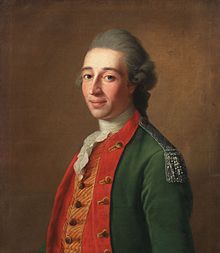Johann Jakob von Pistor
Johann Jakob Pistor , from 1780: Johann Jakob von Pistor ( Russian Яков Матвеевич Пистор; Jakow Matwejewitsch Pistor ; born August 3, 1739 in Kassel , † September 23, 1814 in Schmalkalden ) was a Russian lieutenant general .
Life
He was born the son of Matthias Konrad Pistor (1691–1761), who in 1749 became a rifle manufacturer in Schmalkalden in the Schmalkalden lordship , an exclave of the Landgraviate of Hessen-Kassel .
He studied from 1755 to 1757 at the University of Göttingen and then for a year at the University of Marburg . After completing his studies, he became a lieutenant in the Hessian artillery in 1758 . During his service, he took part in three campaigns of Count Wilhelm von Schaumburg-Lippe in the Seven Years' War ; the latter had come to appreciate him and wanted to take him to Portugal , but Landgrave Friedrich II of Hesse-Kassel refused the request of the Count of Schaumburg-Lippe.
When Landgrave Friedrich II introduced war science lectures at the Kassel Collegium Carolinum in the summer of 1764 , Johann Jakob von Pistor was commissioned to be the first teacher to teach war studies. He taught war architecture and artillery studies. The training was mainly based on mathematical knowledge, so that he first had to impart the necessary prior knowledge to his students. His lectures were based on the writings of Bernard de Bélidor and Abraham Gotthelf Kästner as well as Prussian textbooks for war science subjects and his own work, always combining practice with theory.
In the winter of 1771/1772 he received the notification that General Friedrich Wilhelm Bauer had appointed him to the Russian service; in the meantime he had been promoted to captain.
Empress Catherine II employed him as an artillery major with the rank of lieutenant colonel . It was used in mining and salt works , as well as in deepening the Obvodny Canal . On April 14, 1789 he was promoted to major general. He was Chief of the Russian General Staff from 1789 to 1796 and took part in the Russo-Turkish War from 1787 to 1791.
As one of the most important commanders of the Russian armed forces in the Warsaw Uprising in 1794, he wrote a treatise for Empress Catherine II on the fighting in Warsaw and the entire Kościuszko uprising . A copy of the work in French was sent to the Prussian King Friedrich Wilhelm II , in whose archives it was later found by Napoleon's soldiers after the conquest of Berlin during the coalition wars . The work was published in 1806 and its Polish translation appeared 100 years later.
Because of his good performance, he was ennobled and appointed lieutenant general.
For health reasons he took his leave in 1797 and returned to Kassel. He rejected the request of Landgrave Wilhelm IX. from Hessen-Kassel, who wanted to employ him in his own service, as well as an offer from England. During the time of the Kingdom of Westphalia , he moved from Kassel to Schmalkalden.
Fonts (selection)
Footnotes
- ↑ His siblings were Johann Thomas Pistor, who took over the rifle factory after his father's death, and Maria Anna Magdalena, who married the university professor and writer Johann Wilhelm Christian Gustav Casparson .
Literature (selection)
- Bernhard von Poten: Pistor, Johann Jakob von . In: Allgemeine Deutsche Biographie (ADB). Volume 26, Duncker & Humblot, Leipzig 1888, p. 185.
- Johann Jakob von Pistor . In: Basis for a Hessian scholar and writer story , 2nd volume. Göttingen 1782. p. 131 f.
- Johann Jakob von Pistor . In: Allgemeines Künstlerlexikon , Volume 2. Zurich 1810. S. 1112.
| personal data | |
|---|---|
| SURNAME | Pistor, Johann Jakob von |
| ALTERNATIVE NAMES | Pistor, Johann J. von; Pistor, Johann Jakob; Pistor, Johann J .; Pistor, Jan Jakub de |
| BRIEF DESCRIPTION | Russian lieutenant general |
| DATE OF BIRTH | August 3, 1739 |
| PLACE OF BIRTH | kassel |
| DATE OF DEATH | September 23, 1814 |
| Place of death | Schmalkalden |
